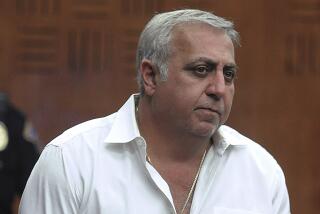Cleaning up Congress
- Share via
LIKE ENRON’S ANDREW FASTOW or WorldCom’s Bernard Ebbers in the scandals that shook corporate America earlier this decade, Jack Abramoff is the quintessential “why stop there?” character in the lobbying scandal currently roiling Washington. He took the capital’s custom of wooing politicians to a grotesque, illegal but not necessarily illogical extreme. Now that Abramoff has pleaded guilty to bribing at least one member of Congress, among other things, Washington is bracing itself for a major corruption scandal.
It will be interesting to see how many other members of Congress are ensnared in an Abramoff-assisted prosecution, whether the scandal marks the definitive end of the DeLay era and what effect the stench of corruption has on this year’s congressional elections. But in the end, what will matter most is how the scandal will affect Congress’ attempts to reform itself.
Abramoff was almost a caricature of the connected lobbyist. He bilked his own clients, many of whom had conflicting interests. He not only doled out free food and drink to politicians, he owned a luxury restaurant where they could be comped. He served as a kind of concierge for members of Congress and their staffs, offering tickets to sporting events and lavish golf trips to Scotland “in exchange for legislative favors,” according to the charges filed against him.
That’s the rub -- proving a quid pro quo is the challenge for the prosecution in any corruption case. American political customs demand that we suspend our disbelief and buy into the notion that there typically is no quo for the quid, that lobbyists and their business clients shower millions of dollars on politicians not because they are seeking favors but because it is the patriotic thing to do. The conventions of the game also require us to believe that politicians aren’t influenced by huge campaign contributions, and that they go on golfing trips to Scotland to better educate themselves on pressing legislative business.
Sometimes it takes a “why stop there?” character like Abramoff to show how laughable such conventions can be. Rep. Bob Ney (R-Ohio), a frequent beneficiary of the lobbyist’s largesse and a frequent advocate for the lobbyist’s clients, is believed to be the unnamed member of Congress in the prosecution’s case, but he is insisting that he always took action on the merits. Other members, including House Speaker J. Dennis Hastert (R-Ill.), are rushing to give all their Abramoff-tainted campaign donations to charity, while insisting they did nothing wrong.
Democrats’ claims that Republicans are mired in a culture of corruption seem disingenuous in light of their party’s tawdry record when it controlled the House of Representatives. But there is a sense of poetic justice about the GOP facing most of the Abramoff fallout. As House majority leader, Tom DeLay, an Abramoff ally, launched the “K Street Project” to align Washington’s traditionally bipartisan lobbyist elite with the Republican leadership, thereby starving the opposition of K Street dollars. DeLay is why Abramoff is seen primarily as a GOP problem.
And that is why it will be up to a new generation of Republican leaders in the House to push for meaningful anti-corruption reforms in Congress. The quid pro quo here is obvious: To ensure their majority, they have to clean up their act.
More to Read
Sign up for Essential California
The most important California stories and recommendations in your inbox every morning.
You may occasionally receive promotional content from the Los Angeles Times.










